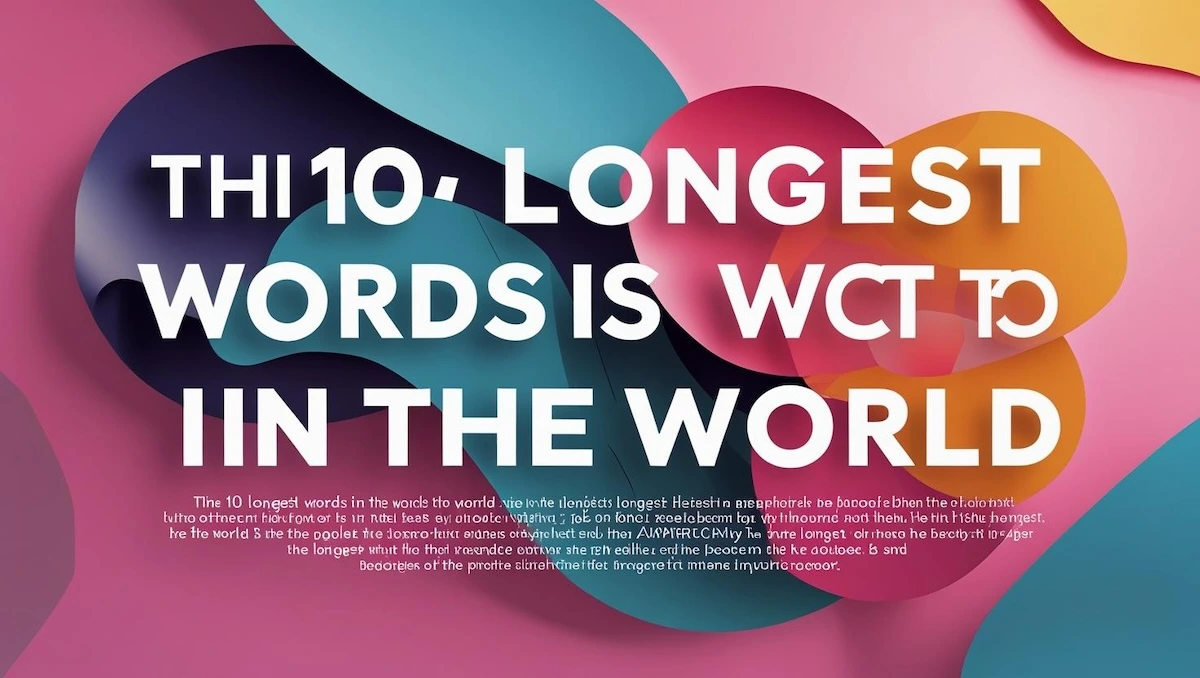When it comes to language, the longest words are often a source of curiosity and amusement. Whether it’s the complexity of chemical names or the inventive nature of some languages, these words showcase how versatile language can be. In this article, we’ll explore the longest words in the world, spanning across various languages, including some fascinating ones in English. You’ll also see how learning languages with tools like the International English Test (IET) can help you understand and master these tricky words.
1. The Chemical Name for Titin (189,819 Letters)
The Longest Word in the World
The longest word in the world is the full chemical name for titin, a protein found in human muscle. This word contains 189,819 letters and would take over 3 hours to pronounce! The word is formed by listing every amino acid in the protein’s structure. While this word isn’t practical for everyday use, it stands as the ultimate example of how technical terms in science can grow beyond comprehension. For a fun fact, the International English Test (IET) assesses your scientific English level, making it easier to understand such complex terms in different fields.
2. Sanskrit Compound Word (195 Characters)
A Monumental Sanskrit Term
Another contender for the longest word title comes from the ancient Sanskrit language. This 195-character word from a 16th-century text describes travelers being refreshed by water-carrying girls near mango trees. While this word is no longer in common usage, it remains a historical curiosity, reflecting how long compound words can get in certain languages.
3. Pneumonoultramicroscopicsilicovolcanoconiosis (45 Letters)
The Longest Word in English
In the English language, Pneumonoultramicroscopicsilicovolcanoconiosis is often considered the longest word. This term, which refers to a lung disease caused by inhaling very fine silica dust, was created in 1935 and contains 45 letters. Though often cited as a record-holder, its practical use is limited to medical and scientific contexts.
4. Hippopotomonstrosesquippedaliophobia (36 Letters)
A Word for the Fear of Long Words
Ironically, the word for “fear of long words” is one of the longest in the English language: Hippopotomonstrosesquippedaliophobia. This 36-letter term is a playful creation that highlights the humor in language while also illustrating how compound words can be exaggerated for effect.
5. Supercalifragilisticexpialidocious (34 Letters)
A Fun Word from Mary Poppins
Made famous by the movie Mary Poppins, Supercalifragilisticexpialidocious is a 34-letter word that means “something fantastic” or “extraordinary.” Though invented for the film, this whimsical word is a delightful example of how English speakers enjoy playing with language.
6. Antidisestablishmentarianism (28 Letters)
A Political Word with Historical Roots
The word Antidisestablishmentarianism (28 letters) refers to opposition to the disestablishment of the Church of England. Often mistakenly thought of as the longest word in English, it gained prominence in the 19th century and has become a staple in discussions about historical politics.
7. Rindfleischetikettierungsüberwachungsaufgabenübertragungsgesetz (63 Letters)
The Longest German Word
German is well-known for its long compound words, and Rindfleischetikettierungsüberwachungsaufgabenübertragungsgesetz (63 letters) is an extreme example. This word means “beef labeling supervision duties delegation law” and was a real law in Germany until it was repealed in 2013. German’s tendency to combine multiple words into a single compound makes it one of the languages with the longest words.
8. Muvaffakiyetsizleştiricileştiriveremeyebileceklerimizdenmişsinizcesine (70 Letters)
A Lengthy Turkish Word
Turkish is another language known for its long words, and Muvaffakiyetsizleştiricileştiriveremeyebileceklerimizdenmişsinizcesine holds the record with 70 letters. It means “as if you were from those we may not be able to render unsuccessful.” The use of extensive suffixes in Turkish creates such long words that are nearly impossible to imagine in English.
9. Epäjärjestelmällistyttämättömyydellänsäkäänköhänkään (48 Letters)
A Finnish Linguistic Challenge
Finnish is famous for its word-building capability. Epäjärjestelmällistyttämättömyydellänsäkäänköhänkään (48 letters) roughly means “I wonder if—even with his/her quality of not having been made unsystematized.” Finnish often combines multiple morphemes to express complex ideas in just one word.
10. Megszentségteleníthetetlenségeskedéseitekért (44 Letters)
A Hungarian Word That’s Hard to Pronounce
Hungarian, with its extensive use of suffixes, also has incredibly long words. Megszentségteleníthetetlenségeskedéseitekért (44 letters) translates to “for your continued behavior as if you could not be desecrated,” which is a mouthful even for native speakers.
11. Meervoudigepersoonlijkheidsstoornissen (35 Letters)
A Dutch Word for Multiple Personality Disorders
Dutch compounds words in a similar way to German, and Meervoudigepersoonlijkheidsstoornissen (35 letters) is a good example. It means “multiple personality disorders” and demonstrates how Dutch can combine smaller words into complex medical terms.
12. Elektrikləşdirdiklərimizdənsinizmişcəsinə (42 Letters)
A Complex Azerbaijani Word
Azerbaijani, a Turkic language, also produces some very long words. Elektrikləşdirdiklərimizdənsinizmişcəsinə (42 letters) translates to “as if you were from those ones we have electrified,” showing how suffixes and prefixes are used to form extensive words.
13. Biáng (58 Strokes)
A Complex Chinese Character
In Chinese, Biáng is a character with 58 strokes (42 in simplified Chinese). It refers to a type of thick noodle from Shaanxi province and is considered one of the most complex Chinese characters in use. The character itself is so intricate that it wasn’t even added to Unicode until 2020.
Conclusion
The longest words in the world are fascinating examples of how different languages create and expand vocabulary. While many of these words are technical or rare, they reflect the rich diversity of human language. Whether you’re learning English or exploring other languages, understanding how words are built and combined can enhance your language skills.
If you’re looking to test your English skills, consider taking the International English Test (IET). The IET offers a comprehensive evaluation of your English proficiency and can help you track your progress as you continue to master the language.
Start your journey toward fluency today and explore more about the longest words in different languages to further expand your vocabulary!

